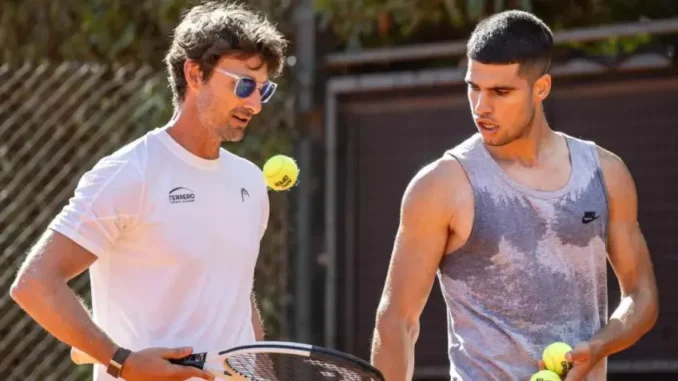
In the high-stakes world of professional tennis, where mental fortitude often separates champions from contenders, Carlos Alcaraz’s recent vulnerability has sent ripples through the sport. The 22-year-old Spaniard, a four-time Grand Slam champion, stunned the tennis community with a candid admission during a Netflix documentary, revealing his fear that tennis could become an “obligation” rather than a passion. This statement, coupled with remarks from his coach Juan Carlos Ferrero about Alcaraz’s commitment, drew a surprised reaction from renowned coach Patrick Mouratoglou, who called it a “rare declaration to hear at this level.” As Alcaraz prepares for a blockbuster Italian Open final against Jannik Sinner on May 18, 2025, Mouratoglou’s analysis highlights the delicate balance between ambition and authenticity that defines the young star’s journey.
Alcaraz’s 2025 season has been a tale of triumphs and turbulence. His victories at the Rotterdam Open and Monte-Carlo Masters, where he outclassed Lorenzo Musetti 3-6, 6-1, 6-0, showcased his brilliance on clay and hard courts. Yet, a leg injury forced him to miss the Madrid Open, and earlier setbacks, including a semifinal loss to Jack Draper at Indian Wells and a first-round exit to David Goffin at Miami, exposed cracks in his consistency. It was after the Indian Wells defeat that Alcaraz first hinted at his mental struggles, admitting, “I always say that I have to be focused on myself, on my own game. I think today I was more worried about his level, his game, than myself… When you’re thinking more about the opponent than yourself, then it is a big problem.” Mouratoglou, speaking at the time, noted the risk of such honesty, suggesting, “Most other players would not say it, that is his choice. Maybe the fact that he verbalised it will put more pressure on him.”
The Netflix documentary amplified these concerns, with Alcaraz confessing, “At the moment, my greatest fear would be to consider tennis as an obligation.” Ferrero, his long-time coach, added fuel to the narrative, stating, “Carlos must choose who he wants to be,” and hinting at a potential departure if Alcaraz’s dedication wanes: “If you’re not sure [you want to be the best], if you want to be number 15 in the world, we’ll lower the expectations. But the way I am, I think I’d find it very hard to keep going.” Mouratoglou, reflecting on these remarks on LinkedIn, expressed both intrigue and caution. “It’s a risky move,” he said of Ferrero’s public challenge, noting that while it might motivate Alcaraz, it could also “hurt the player and hurt the relationship between the two.” He praised Alcaraz’s openness as a bold choice but questioned its long-term impact, asking, “Let’s see how Carlos received it. Maybe he will have a reaction to that, a positive one.”
Mouratoglou, who has coached legends like Serena Williams and currently mentors Naomi Osaka, draws from decades of experience in navigating the pressures of elite tennis. His own book, Champion Mindset, explores overcoming insecurities, a theme that resonates with Alcaraz’s current crossroads. The Spaniard’s emotional nature, which Mouratoglou previously lauded as a strength in 2022, noting his “incredible mental strength” and “complete game” after his US Open win, now appears to be a double-edged sword. Alcaraz’s physicality—evident in his 283.5 Serve Rating, among the ATP’s top 10—remains a weapon, but his mental state is under scrutiny as he faces Sinner, who boasts a 73-6 record since 2024.
In Rome, Alcaraz has shown signs of rediscovery, delivering what Mouratoglou called “one of his best matches of the year” against Draper. Post-match, he turned to his agent, smiling, and said, “What’s beautiful is that we’re all in the same boat,” signaling unity within his team. This cohesion could be key as he chases a 19th career title and a seventh Masters 1000 crown. Mouratoglou sees the Sinner final as more than a match: “The final this Sunday between Sinner and Alcaraz, special for several reasons, can mark a turning point in many ways.”
Alcaraz’s willingness to bare his soul sets him apart in a sport where players often guard their vulnerabilities. Whether this transparency fuels his resurgence or adds pressure, as Mouratoglou fears, remains to be seen. For now, the tennis world watches as Alcaraz, with his explosive forehand and infectious charisma, battles not just Sinner but his own inner doubts, striving to prove that his love for the game can triumph over obligation.
Leave a Reply